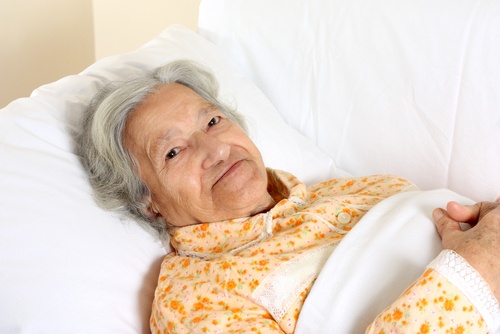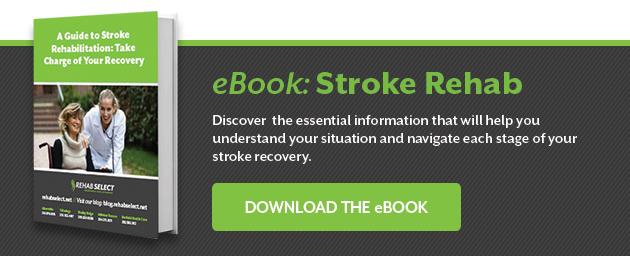
For patients and their loved ones, the physical effects of stroke – paralysis, weakness, vision loss, and pain, among many other potential problems – are clear. However, the emotional effects of stroke can be much more difficult to recognize, and they can be just as traumatic and limiting as physical problems – even more so in some cases. For that reason, understanding these changes and taking steps to address them is essential to making the most of stroke rehab and recovery.
Stroke affects everyone differently. The long and short-term consequences depend on the area of the brain affected, the severity of injury to that area, and the overall health of the patient in question. That said, there are a number of effects of stroke on mental health that many survivors have in common.
Effects of Stroke on Mental Health
Medical research has shown that “An under-recognized effect of stroke is the impact on mood that often occurs. Many individuals develop depression, anxiety, PTSD, and other psychological sequelae.” These conditions can significantly affect patients’ lives and relationships.
There is even evidence that having a stroke may alter brain chemistry in certain cases. The American Stroke Association reports that the area of the brain injury and resulting chemical changes may have significant effects on the brain.
Depression Post-Stroke
A stroke is a terrifying and life-changing event, so it is perfectly normal to feel a sense of sadness and loss. However, it is important to know that for many stroke survivors, these feelings go much deeper than can be accounted for by that trauma. Rather, they are caused by physical and chemical changes in the brain related to brain injury. According to the American Stroke Association, post stroke depression affects between one- and two-thirds of stroke survivors. It's characterized by feelings of overarching sadness, lack of pleasure in old activities, or changes in eating and sleeping patterns.
Serious post stroke depression requires medical attention. It can be characterized by feelings of hopelessness, worthlessness, apathy, sluggishness, and, in some cases, thoughts of death or suicide. This sort of depression, left untreated, can last up to three years after a stroke and can significantly impact a person's progress in stroke rehab, leaving them unable to regain the motivation and focus they need to work towards recovery and reclaim their lives.
Anxiety After a Stroke
Feeling afraid or anxious is also common in the aftermath of a stroke and is a reasonable reaction to an unexpected and traumatic event. In fact, anxiety after a stroke is found in about 20 percent of stroke survivors. However, for many stroke survivors, fearfulness and anxiety can become constant and overwhelming. Generally, chronic, severe anxiety after stroke is due to stroke-related brain injury. Treatment can prevent this condition from becoming a debilitating one that interferes with stroke recovery.
Emotional Lability
Emotional lability is a condition in which a person is much more emotional than usual and/or has trouble controlling their emotions. They may become upset over small things or cycle through strong, exaggerated emotions very quickly (i.e., crying one minute and then laughing the next) with no obvious reason for either reaction. Each individual possesses a unique emotional makeup, and what constitutes emotional expression varies greatly from person to person. Therefore, indicators of emotional lability are relative to one's own baseline. However, common manifestations of the emotional effects of stroke may include:
-
Finding yourself crying or laughing for no reason.
-
Expressing your emotions more intensely than you actually feel them.
-
Feeling like you have no control over your emotions and that even the smallest thing can set you off.
-
Having emotions that seem out of place or come and go very quickly.
Emotional lability is a common effect of many neurological conditions and often occurs as a side effect of brain injuries inflicted by stroke. Typically, the condition improves or resolves over time as the brain heals, but if emotional lability is severe enough to inhibit progress with stroke rehab, it can be treated with medication.
Stroke Cognitive Impairments
Stroke survivors may have trouble with memory, thinking, attention, learning, and impulse control. Stroke impacts cognitive functions such as attention, memory, language, and orientation. The cognitive domains most affected are often attention and executive functions. Memory issues frequently become pronounced upon diagnosis of a stroke. In fact, some research has suggested that approximately 30% of stroke patients develop dementia within one year of stroke onset.
Following directions may be difficult, as brain injury can slow or impair the ability to process information, and communication may be a struggle. Reading and writing can become a challenge, as can tasks like paying bills or balancing a checkbook. For many people, these frustrating stroke cognitive impairments will ease with healing and therapy, but for some, they will be permanent challenges.
Understanding the potential for emotional and cognitive changes in the aftermath of a stroke is essential to the process of healing and recovery and preventing post stroke depression. If not properly addressed during the stroke rehab process, these changes can have a significant impact on stroke survivors, slowing progress towards recovery and affecting quality of life over the long-term, as well as relationships with family, friends, and caretakers.
Find Stroke Rehab in Alabama for Recovering from Emotional Effects of a Stroke
At Rehab Select, we understand the effects of stroke on mental health. Our skilled therapy teams offer specialized stroke rehabilitation programs tailored to address cognitive effects and post stroke depression. With a focus on evidence-based care, our holistic approach aims to improve cognitive function, alleviate anxiety, and support your journey toward a full recovery.
Find out if we can help you or a loved one at one of our five Alabama stroke rehab programs. Schedule a meeting today!





